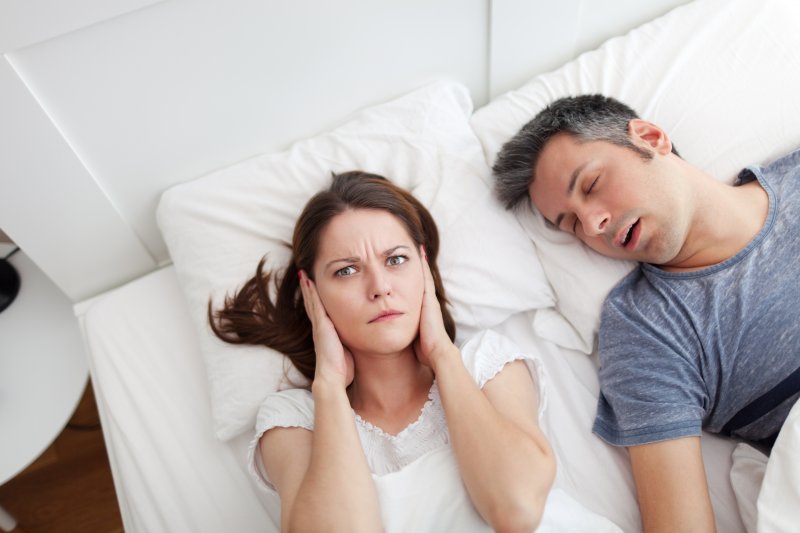
According to SleepFoundation.org, approximately 32% of Americans snore, and chances are that you know at least one of them. Whether it’s yourself or a loved one, snoring can be extremely annoying, but there is a more serious side as well. It’s one of the most common symptoms of sleep apnea, a condition that is known to cause daily exhaustion as well as drastically increase someone’s risk of being in a motor vehicle accident or suffering a heart attack or stroke. While snoring and sleep apnea are definitely connected, they are not one in the same, and being able to spot the differences can have a big impact on someone’s overall health.
What Exactly is Snoring?
Snoring occurs when the tissues in someone’s throat and mouth vibrate as they breathe during sleep. When we lay down and our body relaxes, the soft oral tissues can end up partially obstructing the airway, so they react when the air rushes past them. Some people snore every single night, while others only do it if they are extremely tired or ingest alcohol or certain medications (sedatives) a few hours before bed.
What is Sleep Apnea?
When a person has sleep apnea, their breathing briefly but frequently stops several times throughout the night because the airway is being cut off. This can occur for many reasons, but the most common is that the tissues in the mouth and throat are collapsing and blocking the airway. This is called Obstructive Sleep Apnea (OSA), and it’s by far the most prevalent form of the condition. Large tonsils/adenoids, a naturally narrow airway, and obesity have all been shown to be risk factors for OSA.
How Are Snoring & Sleep Apnea Connected?
Most people who have sleep apnea also snore, and this is because as their airway is closing, the tissues in the throat are vibrated by the air. Basically, snoring often occurs right before an apnea event (breathing temporarily stops). But it’s important to point out that not everyone who snores has sleep apnea.
To determine if someone has sleep apnea, there needs to be more symptoms than just snoring. Is the person tired all the time despite getting seven to nine hours of sleep? Do they experience morning headaches or grogginess? Do they wake up in the middle of the night gasping for breath or sweating a lot? Has someone noticed their breathing starting and stopping while they sleep?
Snoring on its own, while grating, isn’t nearly as damaging as sleep apnea. To be properly diagnosed, a patient must complete a sleep test, in which a sleep physician evaluates data such as heart rate, brain activity, and respiration to determine whether or not someone has the condition.
How to Treat Both
Fortunately for people suffering with sleep apnea and bed partners who have to put up with snoring, there are solutions proven to help alleviate both. CPAP therapy is by far the most popular sleep apnea treatment, but many patients are now choosing to instead wear custom-made sleep mouthguards to bed. These are specially designed by highly trained sleep dentists, and the appliances keep the airway open throughout the night. This allows a person to breathe normally and sleep deeply, preventing both sleep apnea and snoring at the same time.
Snoring is often the subject of jokes and good-hearted fun, but sleep apnea is deadly serious. If you or someone you care about snores and experiences any of the symptoms touched on above, be sure to reach out to a local sleep dentist. They can help you, and everyone else in your home, start getting the rest you all deserve.
About the Author
Dr. Jeff Rodgers is a dentist that specializes in sleep medicine, and he has been serving the Dunwoody and Greater Atlanta area for over 20 years. He is a Diplomate of both the American Board of Dental Sleep Medicine and the American Sleep and Breathing Academy, meaning he offers a unique level of expertise when it comes to helping those with snoring and sleep apnea problems. He has already helped countless patients start sleeping better using custom-made mouthguards, and he’s eager to do the same for you or a loved one. To learn more or schedule a consultation with Dr. Rodgers, click here or call (770)394-4310.
